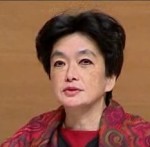Originally published on Rue89- 12/14/2008 .
 An opening speech can be of very high quality. Such was the case, last Thursday,with the opening lecture by Anne Cheng, newly appointed Professor of Intellectual History of China at the “College de France”.
An opening speech can be of very high quality. Such was the case, last Thursday,with the opening lecture by Anne Cheng, newly appointed Professor of Intellectual History of China at the “College de France”.
A bridge between cultures:
“Daughter of Chinese parents, between a father who stayed in France ( Francois Cheng, the novelist and poet, member of the Academie Française) and a mother who returned to Mao’s China and then disappeared, but also the daughter of the school of the Republic where I followed all the curriculum up to the Ecole Normale Supérieure”.
For nearly thirty years, she devoted herself to Chinese studies and has carried out teaching and research on the intellectual history of China in particular on Confucianism in the CNRS (National Center for Scientific Research) and then in “Langues Orientales” before being elected to the College de France.
Her translation of “Analects” of Confucius and her “Intellectual History of China” are must reads.
Sinology, a French invention …
The list of major French sinologists is often the same as the history of professors at the College de France, from Edouard Chavannes (1865-1918) and Paul Pelliot (1878-1945) to Marcel Granet (1884-1940) and Henri Maspero (1883-1945) to whom succeeded Paul Demieville (1894-1970). The contemporary, Jacques Gernet and Pierre-Etienne Will, current Professor of the Chair of History of Modern China, continue a brilliant tradition.
Unfortunately, misconceptions about China are often shared in public opinion but also among the political or economic “elite”. Also, how to bring China into the consciousness: there is often not the minimum knowledge that would allow to build and hasty generalizations are often found.
A Trans-Pacific Highway:
The U.S. were the first to realize that they had to take China into account first as an ideological enemy and then as a partner. American Sinology experienced an unprecedented boom with visits of Chinese intellectuals and many chairs in American universities. The French sinology resists with difficulty, especially as publishing in English has often, in fact, become compulsory.
At the same time, China wants to recover its intellectual and cultural tradition, stimulated by archaeological discoveries that glorify a spectacular past.
In the 2000s, despite the lasting impact of the Cultural Revolution who cut many roots, there is a revival of tradition, of a feeling of revenge for some Chinese intellectuals after a long intellectual domination of the “West.
The globalization of technology, the highly developed use of the Internet in China, the importance of field studies and a multidisciplinary approach, all these factors are changing Sinology at a rapid pace, but sometimes the approach can be somewhat superficial if not rooted in the great texts of Chinese tradition.
A difficult dialogue:
The dialogue between cultures can lead to no dialogue at all. The West dreams of ancient China while China becomes obsessed by modern intellectuals and sociologists from the U.S. and Europe.
Chinese intellectual history should not be considered as “the other” with the risk of an over systematic “intercultural comparison”. For Anne Cheng, this approach is not a priority, and different elements, different eras within the same culture can be compared with positive results.
This type of debate among academics is important and complex even if sometimes it became a bit personal. You can read the little book by Jean Francois Billeter “Contre François Jullien (Editions Allia, 2006) and response of the latter, the author of numerous books and a professor at the University of Paris VII, in an attempt to understand the historical roots of these visions of China and the idea that it is “a completely different world from ours and even opposite to ours”.
It is understood, “the choice of intellectual history as a method of approach”, is a priority for Anne Cheng. Her lectures on “Confucius revisited: old texts, new speech” begins next January 14.
Bertrand Mialaret
► “Analects” of Confucius. Seuil. 153 pages. € 7.50.
► “Intellectual History of China”. Seuil, paperback. 750 pages. € 12.





